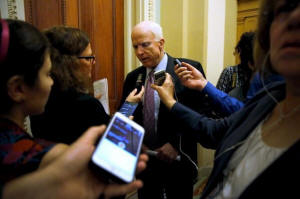|
 U.S.
senators call for 20,000 troops in Syria and Iraq U.S.
senators call for 20,000 troops in Syria and Iraq
 Send a link to a friend
Send a link to a friend
[November 30, 2015]
By Stephen Kalin
BAGHDAD (Reuters) - Two senior U.S.
senators called on Sunday for Washington to nearly triple military force
levels in Iraq to 10,000 and send an equal number of troops to Syria as
part of a multinational ground force to counter Islamic State in both
countries.
|
|
 Republicans John McCain and Lindsey Graham criticized President
Barack Obama's incremental Islamic State strategy, which relies on
air strikes and modest support to local ground forces in Iraq and
Syria, and said the need for greater U.S. involvement was underlined
by this month's Paris attacks. Republicans John McCain and Lindsey Graham criticized President
Barack Obama's incremental Islamic State strategy, which relies on
air strikes and modest support to local ground forces in Iraq and
Syria, and said the need for greater U.S. involvement was underlined
by this month's Paris attacks.
"The only way you can destroy the caliphate is with a ground
component," said Graham who is seeking his party's presidential
nomination. "The aerial campaign is not turning the tide of battle."
McCain, chairman of the Senate Armed Services Committee, recently
proposed intervention in Syria by a European and Arab ground force
backed by 10,000 U.S. military advisers and trainers.
On Sunday he and Graham told reporters during a visit to Baghdad
that U.S. personnel could provide logistical and intelligence
support to a proposed 100,000-strong force from Sunni Arab countries
like Egypt, Turkey and Saudi Arabia.
Graham said special forces would also be included.
 Obama last month ordered the deployment of dozens of special
operations troops to northern Syria to advise opposition forces in
their fight against Islamic State, adding to an increasingly
volatile conflict in Syria.
Russia and Iran have ramped up their military support for President
Bashar al-Assad's fight against rebels in Syria's four-and-a-half
year civil war, while the Paris attacks showed how Islamic State has
extended its reach to Western cities.
U.S. counter-terrorism experts have warned that deploying ground
troops risks backfiring by feeding Islamic State's apocalyptic
narrative that it is defending Islam against an assault by the West
and its authoritarian Arab allies.
The U.S.-led coalition which has been bombing Islamic State targets
in Syria and Iraq for more than a year relies heavily on American
resources despite including some 60 nations.
McCain said it would be possible but not easy to rally Arab allies
to contribute to the proposed ground force in Syria.
"The question... is being asked all over the capitals of the West
right now," he said. "(Arab) countries for a long time have not seen
what's happening as a direct threat to them. Now I believe that they
do."
The senators said removing Assad, who is backed by Russia and Iran,
was key to getting Arab Sunni states to back the proposed ground
force.
[to top of second column] |

IRAQ
In neighboring Iraq, where about 3,500 U.S. troops are currently
advising and assisting Iraqi forces, Graham said an increased
American presence would include forward air controllers and aviation
assets as well as special forces to carry out raids like one last
month which resulted in the first U.S. combat death in Iraq since
2011.
The senators met earlier with Iraqi Prime Minister Haider al-Abadi
who they said had welcomed the idea of more U.S. troops.
"If you went up to 10,000, you're not getting pushback from the
Iraqis," said Graham. "The difference between 3,500 and 10,000 is
meaningless politically inside the country (but) militarily
significant."
However, government spokesman Saad Hadithi said Abadi had not
requested U.S. combat troops on the ground but rather asked for more
arms and advisers to increase air support for Iraqi forces. Hadithi
declined to speculate about the number of additional personnel under
discussion.
Leading Iraqi politicians have repeatedly voiced opposition to a
greater role for U.S. forces, which withdrew in 2011 after a nearly
nine-year war that left tens of thousands of Iraqis dead.
Iranian-backed Shi'ite Muslim militias seen as a critical bulwark in
the fight against Islamic State have also resisted U.S. involvement.
"One reason I'd want to have more American troops is it neutralizes
the Shia militia advantage to some extent," said Graham.
(Editing by Ros Russell)
[© 2015 Thomson Reuters. All rights
reserved.]
Copyright 2015 Reuters. All rights
reserved. This material may not be published, broadcast, rewritten
or redistributed.
 |